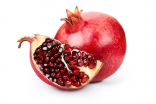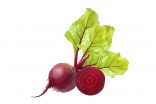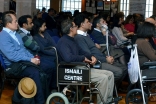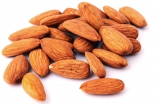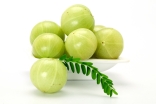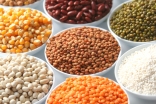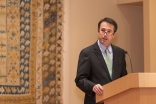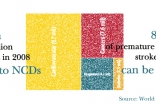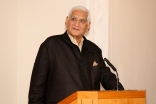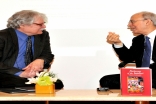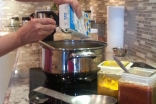Content Tagged with Ismaili Centres
Daraam is a fruit with a reddish, leathery outer skin that houses edible seeds that are divided by white membranes. It is thought to be beneficial to your health.
Chuqander are usually a deep red colour but there are varieties ranging from white, orange and even striped. Both the beets and their greens can be eaten as they are tasty and full of unique nutritious properties.
London, 27 March 2014 – The Secretary of State for Energy and Climate Change, the CEO of an oil and gas exploration and production company and a Professor of Law at a London university took part in a panel discussion on the future of shale gas in the United Kingdom at the Ismaili Centre, London. The event was the latest in the Ismaili Centre Lecture series, which explores the “the big issues of our time.”
More than one billion people around the world live with disabilities – approximately 15 per cent of humanity – but they are excluded from full participation in mainstream society by physical, social, economic and attitudinal barriers. Disability Days and other initiatives organised by the UK Jamat, show that these barriers can be overcome.
You may have memories of your grandma telling you to eat “saath (seven) badaam a day.” Well, as explained in this latest Nutrition Centre A to Z article, research suggests that she was giving you good advice!
The Ismaili Nutrition Centre has launched a new series of articles on simple ideas for popular foods. This A to Z of different fruits, vegetables and everyday ingredients builds greater awareness of basic nutrition and encourages you to try healthy and easy ideas for preparing a range of tasty dishes. This week's entry is about amla, a tangy seasonal fruit that is high in vitamin C.
Over 50 per cent of people with pre-diabetes who eat healthier and are physically active can delay or even entirely prevent themselves from becoming diabetic. For those who have type 2 diabetes, eating cooked pulses along with a high-fibre diet can help control long term blood sugar levels.
John Stackhouse, Editor-in-chief of the Globe and Mail, delivered the Ismaili Centre Lecture on 1 December 2013, in which he described pluralism as being central to Canadian identity. An annual event featuring speakers of distinction, the lecture took place at the Ismaili Centre, Burnaby, part of a growing network of such centres whose role is to encourage exchange, mutual understanding and friendship between peoples of diverse communities and faiths.
Burnaby, Canada, 1 December 2013 – John Stackhouse, Editor-in-chief of the Globe and Mail, delivered the Ismaili Centre Lecture, in which he described pluralism as being central to Canadian identity. Featuring speakers of distinction, Ismaili Centre Lectures are held regularly at Centres around the world, and seek to encourage exchange, mutual understanding and friendship between peoples of diverse communities and faiths.
Ottawa, 27 November 2013 – In a ceremony held at the Delegation of the Ismaili Imamat, Mawlana Hazar Imam was lauded by the Royal Architectural Institute of Canada, who presented the Imam with their highest honour – the 2013 Gold Medal. In his remarks, Hazar Imam expressed his gratitude and went on to describe the connection between architecture and quality of life, explaining how the Ismaili Centres embodied for the Jamat the hopeful aspirations of a forward looking community.
In a ceremony held at the Delegation of the Ismaili Imamat in Ottawa, Mawlana Hazar Imam was lauded by the Royal Architectural Institute of Canada, who presented the Imam with their highest honour – the 2013 Gold Medal. In his remarks, Hazar Imam expressed his gratitude and went on to describe the connection between architecture and quality of life, explaining how the Ismaili Centres embodied for the Jamat the hopeful aspirations of a forward looking community.
Lisbon, 7 September 2013 – Mawlana Hazar Imam is in Portugal for the 12th cycle of the Aga Khan Award for Architecture, which was presented yesterday at Lisbon’s São Jorge Castle. As part of his visit Hazar Imam also held meetings with a number of senior Portuguese officials, and presided over the signing ceremony of a renewed Memorandum of Understanding between the Catholic University of Portugal and the Aga Khan University.
In 2008, non-communicable diseases were responsible for an astounding 63 per cent of deaths world-wide – more than all other causes combined. Known as NCDs, they include diabetes, heart disease and cancers, and are a growing concern to people of South East Asian descent. However, these diseases are largely preventable and their impact can be significantly reduced.
The Harmony Project premiered before audiences at the Ismaili Centre, London on 13 and 14 April 2013. Written, directed and performed by members of the United Kingdom Jamat, the theatrical production follows the story of a group of fictional characters from completely different backgrounds, brought together to create a show.
At a special event held at the Ismaili Centre, Prince Amyn spoke in honour of the illustrious career of Professor Charles Correa, and acknowledged his long-standing partnership with the AKDN.
London, 16 May 2013 – At a special event held at the Ismaili Centre, Prince Amyn spoke in honour of the illustrious career of Professor Charles Correa, and acknowledged his long-standing partnership with the AKDN. Professor Correa is widely recognised in the field of urban planning not only for creating significant designs, but also for addressing social challenges through the medium of architecture.
During a recent on-stage conversation held at the Ismaili Centre, Burnaby, Dr Farhad Daftary spoke about what motivated him to abandon his doctoral pursuits in Economics in the 1960s in order to seek out a future in Ismaili studies. The dialogue took place as part of a book launch for a recently published collection of scholarly perspectives on areas of Ismaili history and thought titled Fortresses of the Intellect.
Childhood obesity rates in the United States have more than tripled in the past thirty years, with many other western countries showing similar trends. What foods are children eating that may be contributing to this epidemic, and what can be done? Researchers at the US National Cancer Institute used the national nutrition survey database to find answers.
Eating too much sodium and not enough potassium has been shown to increase blood pressure, which can be dangerous because it makes the heart work harder than normal and can lead to heart disease or stroke. Recently, the World Health Organization (WHO) issued new recommendations on how much sodium, salt and potassium people should eat for good health.
Milad-un-Nabi marks the anniversary of the birth of the Holy Prophet Muhammad (may peace be upon him and his family). To commemorate this anniversary, The Ismaili Centre, London hosts an annual lecture on a particular aspect of the life and teachings of the Holy Prophet.


